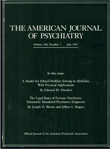Traumatic grief as a risk factor for mental and physical morbidity
Abstract
OBJECTIVE: The aim of this study was to confirm and extend the authors' previous work indicating that symptoms of traumatic grief are predictors of future physical and mental health outcomes. METHOD: The study group consisted of 150 future widows and widowers interviewed at the time of their spouse's hospital admission and at 6-week and 6-, 13- , and 25- month follow-ups. Traumatic grief was measured with a modified version of the Grief Measurement Scale. Mental and physical health outcomes were assessed by self-report and interviewer evaluation. Survival analysis and linear and logistic regressions were used to determine the risk for adverse mental and physical health outcomes posed by traumatic grief. RESULTS: Survival and regression analyses indicated that the presence of traumatic grief symptoms approximately 6 months after the death of the spouse predicted such negative health outcomes as cancer, heart trouble, high blood pressure, suicidal ideation, and changes in eating habits at 13- or 25-month follow-up. CONCLUSIONS: The results suggest that it may not be the stress of bereavement, per se, that puts individuals at risk for long- term mental and physical health impairments and adverse health behaviors. Rather, it appears that psychiatric sequelae such as traumatic grief are of critical importance in determining which bereaved individuals will be at risk for long-term dysfunction.



